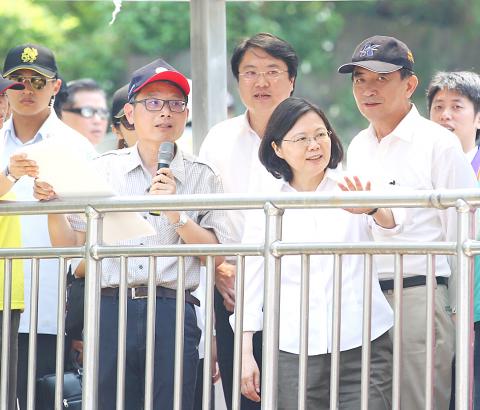The Executive Yuan’s proposed budget for the so-called “development of aquatic environments” project of the Forward-looking Infrastructure Development Program is “clearly insufficient” and would likely hamper efforts to prevent floods, Chinese Nationalist Party (KMT) lawmakers said yesterday.
The Cabinet introduced the aquatic environments program to facilitate the nation’s water distribution and improve drainage systems in flood-prone areas, and has planned a NT$250.7 billion (US$8.33 billion) budget out of the NT$890 billion earmarked for the infrastructure project.
KMT Legislator-at-large William Tseng (曾銘宗) said two of the three project objectives outlined by President Tsai Ing-wen’s (蔡英文) administration — ensuring steady water supplies and preventing flooding — would cost more than NT$220 billion, but the administration has not yet laid out any plans to assess the viability of the objectives.

Photo: CNA
He panned the administration for designating 43 areas as “highlights” for the program without informing the public how it intends to attain its goals, calling the move “dangerous.”
Flood prevention and stable water distribution affect people’s livelihoods and the Tsai administration should address the issues with prudence rather than advertising them as “highlights” of its governance, Tseng said.
Another plan to build waterfront parks, which would cost about NT$28 billion, is “not directly related to people’s safety” and should therefore be put on hold so the money could be used for water supply stabilization and flood prevention, he said.
The planned budget allocated for flood prevention is clearly insufficient, KMT Legislator Apollo Chen (陳學聖) said, adding that the proposed projects do not address local governments’ flood prevention needs.
The Water Resources Agency plans to solve flooding in a 200km2 area, which is not enough, Chen said, citing Taoyuan’s Jhongli (中壢) and Gueishan (龜山) industrial zones as examples, which he said have long been neglected by the central government and have been excluded from the forward-looking project.
“Do not expect a quick solution to problems when formulating a plan,” KMT Legislator Wang Hui-mei (王惠美) said.
“The Tsai administration has neglected issues of illegal lumbering and building development in catchment areas, and instead proposes to spend large sums on dredging reservoirs,” Wang said.
“But how do we rid reservoirs of sediment without first stepping up efforts to protect river heads? How would water shortages be solved?” Wang added.
Instead of spending money on building waterfront parks, the government should address leakages during the water distribution process, as about 10 reservoirs worth of water is lost through leaking pipes every year, she said.

Taiwan has received more than US$70 million in royalties as of the end of last year from developing the F-16V jet as countries worldwide purchase or upgrade to this popular model, government and military officials said on Saturday. Taiwan funded the development of the F-16V jet and ended up the sole investor as other countries withdrew from the program. Now the F-16V is increasingly popular and countries must pay Taiwan a percentage in royalties when they purchase new F-16V aircraft or upgrade older F-16 models. The next five years are expected to be the peak for these royalties, with Taiwan potentially earning

STAY IN YOUR LANE: As the US and Israel attack Iran, the ministry has warned China not to overstep by including Taiwanese citizens in its evacuation orders The Ministry of Foreign Affairs (MOFA) yesterday rebuked a statement by China’s embassy in Israel that it would evacuate Taiwanese holders of Chinese travel documents from Israel amid the latter’s escalating conflict with Iran. Tensions have risen across the Middle East in the wake of US and Israeli airstrikes on Iran beginning Saturday. China subsequently issued an evacuation notice for its citizens. In a news release, the Chinese embassy in Israel said holders of “Taiwan compatriot permits (台胞證)” issued to Taiwanese nationals by Chinese authorities for travel to China — could register for evacuation to Egypt. In Taipei, the ministry yesterday said Taiwan

‘LIKE-MINDED PARTNER’: Tako van Popta said it would be inappropriate to delay signing the deal with Taiwan because of China, adding he would promote the issue Canadian senators have stressed Taiwan’s importance for international trade and expressed enthusiasm for ensuring the Taiwan-Canada trade cooperation framework agreement is implemented this year. Representative to Canada Harry Tseng (曾厚仁) in an interview with the Central News Agency (CNA) said he was increasingly uneasy about Ottawa’s delays in signing the agreement, especially as Ottawa has warmed toward Beijing. There are “no negotiations left. Not only [is it] initialed, we have three versions of the text ready: English, French and Mandarin,” Tseng said. “That tells you how close we are to the final signature.” Tseng said that he hoped Canadian Prime Minister Mark Carney

Taiwan is awaiting official notification from the US regarding the status of the Agreement on Reciprocal Trade (ART) after the US Supreme Court ruled US President Donald Trump's global tariffs unconstitutional. Speaking to reporters before a legislative hearing today, Premier Cho Jung-tai (卓榮泰) said that Taiwan's negotiation team remains focused on ensuring that the bilateral trade deal remains intact despite the legal challenge to Trump's tariff policy. "The US has pledged to notify its trade partners once the subsequent administrative and legal processes are finalized, and that certainly includes Taiwan," Cho said when asked about opposition parties’ doubts that the ART was